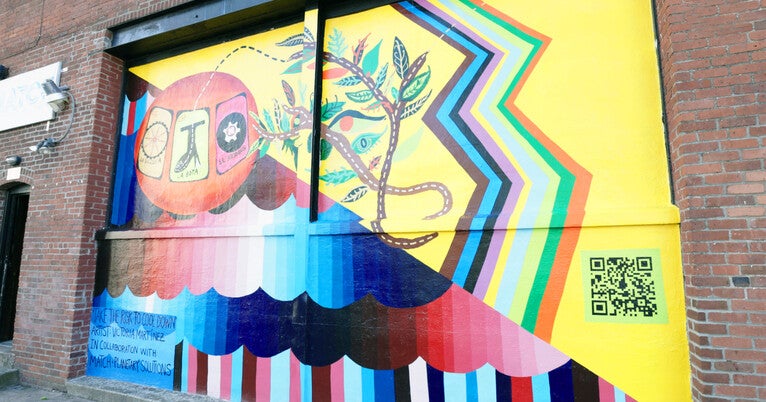
Urban settings are disproportionately affected by the consequences of climate change, but Yale’s Karen Seto believes that the world’s cities can also be a key part of the climate solution.
A New Haven-based collaboration developed by Seto, the Frederick C. Hixon Professor of Geography and Urbanization Science at Yale School of the Environment, and Kymberly Pinder, the Stavros Niarchos Foundation Dean of the Yale School of Art, is a case in point.
After hearing about a new kind of paint that more effectively absorbs heat (and thus reduces surface temperatures), it occurred to Seto that the advance might offer a chance to mitigate the effects of climate change. What’s more, she saw it as opportunity for scholars from across disciplines to educate the local community and inspire action.
Pinder, a renowned scholar of public art and advocate for promoting community engagement in the arts, agreed. The first project to emerge from their partnership is a vibrant mural, called “Take the Risk to Cool Down,” in Fair Haven, a neighborhood of New Haven. (The mural, which was painted on a building at the corner of Mill Street and Saltonstall Avenue, was created by Victoria Martinez ’20 M.F.A., Yale’s Climate Engagement through Art in Cities fellow. An interdisciplinary team, which included Annie Lin, a project specialist at the Yale School of Art, and Asha Ghosh, the Urban Program Manager at the Yale School of the environment, turned the idea into reality.)
The stunning piece of public art, however, is just a first step in the initiative, Pinder said. She now envisions training local artists to create their own murals, and ultimately creating a “sustainable” art community that can transform more of the city’s empty walls while helping to mitigate the effects of climate change.
“Art can pull you into thinking about an issue you may not have wanted to, or even thought you ever would,” Pinder said. “And I think that’s the storytelling capability of all the arts.”
The collaboration, which is described in this video, is part of Yale Planetary Solutions, a university-wide initiative aimed at developing practical responses that will have an impact on Earth’s global crises such as climate, biodiversity, and the disruption of biogeochemical cycles.
This post was originally published on this site be sure to check out more of their content





